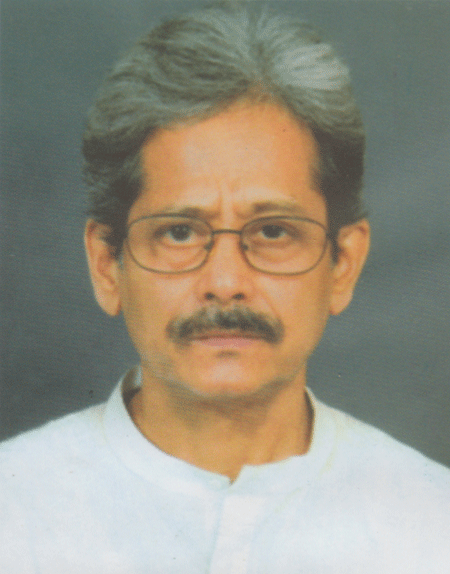
| ⟪ Obituary ⟫ | «Newspaper» | «Home» | «Map&Rev» |
Kashinath Roy, our fabled teacher at the department of English in the University of Dhaka, left this world in the morning on January 17. Seventy-three can be a ripe age for death, but may not be the ripest. But death, like birth, is part of life.
He had taught the English literature in the University of Dhaka for about four decades, beginning in 1975 and he had been dean of arts at the Eastern University until 2019.
Simply dressed, soft spoken and fond of chat sessions, or barvardage as they call it in French, in the teachers’ lounge downstairs where the English department runs in the arts faculty building, he was fabled for many events that we only heard of from our seniors, in the early 1990s, and even from a few people who ran the department administration.
He taught us Thomas Hardy in our third year, the final year of bachelor’s course then, and I was in his tutorial group. But we had to inevitably find him out for tutorial examinations.

As we approached his room upstairs, if he had agreed, a willing colleague of his at the landing would ask him, ‘Kashi, tea?’ He would hesitantly agree, give us the key to his room leaving instructions for us to take the examination there, place the answer scripts on his table, place a paperweight on the scripts to keep them from blowing away and leave the key with the office.
We hardly hesitated to take out books from his shelf and quote from texts, as much as needed, not to the letter but even to the punctuation.
He is fabled to have skipped classes for the remaining duration Dr Syed Sajjad Husain had been the head of the department after Dr Husain asked KR, named so in the department, who had been known for wearing non-European dresses, to wear shirt and pantaloons if he wanted to attend his classes.
One afternoon in our third year in the department, I saw KR in shirt and pants, walking in front of the office room. Dr Niaz Zaman was coming from the opposite direction, passing by KR, stopping short, she looked back, up at KR and said, ‘Kashi?’ He smiled a hesitant smile and they both went their way.
Many of us knew that Kashinath Roy is a poet. But we could hardly lay our hands on the poems he wrote. He had his first compilation published in 2008 and another one in 2011–12.
I bought a copy of his collection of poems called Jibanananda Dekhun, published in 2008, at a little magazine stall in the Ekushey book fair some time eight years ago.
One afternoon, I telephoned him when he was dean of arts at the Eastern University and enquired about where I could buy the second one, Ami Jaha Dite Pari, published in 2011–12, and he said that he had not given the volume for distribution. He asked me to send in someone for a copy. I requested a colleague of mine, junior to me and also a former student of his, and KR signed a copy for me.
Kashinath Roy had an excellent play in verse called Dibhain Kamedi (Divine comedy) that he wrote in 1965 but lost the manuscript in 1970–71. He could find the manuscript in 1994 and the book, having been edited, was published in 2007. He also left his mark of excellence in his short stories.
He appears not to have believed in the hectic engagement of the world of teaching. But for the three books, he wrote about 10 essays in English and about three essays in Bangla, mostly published in academic journals.
His four degrees — secondary, higher secondary, bachelor’s and master’s that his curriculum vitae lists — have never run short of teaching students adequately or adequately kindling a love for learning in students. The number of pages published never appears to have been a measurement of his contribution.
He could fortunately be one among the very few people who valued teaching more than his research, considered essential in modern days in climbing the academic echelon that could have given him a better standing in the academia but would certainly have denied him the satisfaction of making the minds of students for learning.
Although I had always tried to skip attending his classes — this was, of course, true for classes of other teachers too — and this was by all means reciprocal in that he also tried to skip taking classes, he left a lasting impression on our young minds in the university. Too much time spent on ritualistic academia perhaps stifles the soul. He is fortunate enough to have transcended the bounds.
Kashinath Roy wrote, in my feeble translation:
I was once born only to see this world of God
…
I thus stand with my eyes wide open,
Turning to the closed door,
Hoping that the Enlightened some day
would break it open and stand before me.
May he meet the Enlightened that he hoped to see! May his soul rest in peace!
Akkas, Abu Jar M. (2021 Jan. 18). A fabled teacher of ourse. New Age. 9
Rev.: vi·vi·mmxxiii